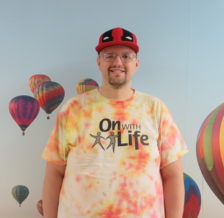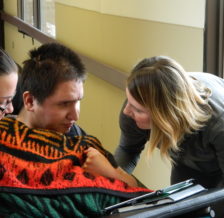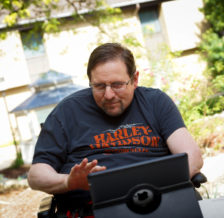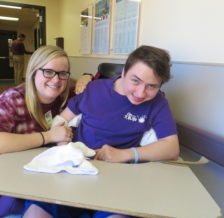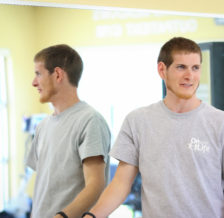News
- Homepage
- >
- Education + Research
- >
- News
On With Life Publishes New Study

On With Life, along with the University of Iowa and the co-creator of the Mayo-Portland Adaptability Inventory (MPAI), have published a study in the Archives of Physical Medicine and Rehabilitation related to effort in rehabilitation and post-acute outcomes. This is an exciting step for On With Life as it relates to effort given by persons served during therapy sessions, a core concept for rehabilitation, and one of particular interest that has not been studied in the post-acute setting.
The study, titled “An Observational Cohort Study of the Role of Level of Effort in Post-acute Brain Injury Rehabilitation” looked at the outcomes and effort data for 101 consecutive admissions to On With Life’s post-acute, inpatient setting in Ankeny to determine whether there was a relationship between Level of Effort (LoE) and rehabilitation outcomes. Level of effort ratings were completed by physical, occupational, and speech therapists using the Acquired Brain Injury Level of Effort Scale (ABI-LoEs), which measured the person served’s engagement and participation during therapy on a 1 (passive) to 7 (maximal effort) scale. These ratings, captured at each therapy session completed during the person served’s stay, where then compared to their clinical outcomes.
Dave Anders, clinical director at On With Life, and one of the authors of the study, has long instilled effort and engagement as core tenants in the therapy team’s philosophy of person-centered rehabilitation at On With Life. “We’ve known intuitively that person served effort plays a significant role in the rehabilitation process,” Anders noted, “through the study, we were able to provide objective data that supports the association between effort and functional outcomes. It’s always exciting when data supports what your gut is telling you.”
The aim of this study was to examine the relationship between a person served’s Level of Effort, as measured using the ABI-LoES, and their rehabilitation outcome as measured by the change in their Mayo-Portland Adaptability Inventory (MPAI-4) and Supervision Rating Scale (SRS) scores from admission to discharge. That is where Dr. Malec and the University of Iowa joined the project.
Through On With Life’s partnership in the Foundation for the Advancement of Brain Rehabilitation (FABR), Dr. Jim Malec, co-creator of the MPAI, assisted in the analysis of the paper and was instrumental in getting the paper published. “Dr. Malec, an internationally recognized expert in the field of brain injury rehabilitation, never tires of learning and exploring new ideas and jumped at the chance to look at this new measure of effort,” Jean Shelton, On With Life CEO, and co-author of the paper explained. Shelton continued, “We can’t thank Dr. Malec enough for his expertise, mentorship, energy, and passion throughout this process.”
Dr. Knute Carter and Sarah Perry, Ph.D. student from the University of Iowa Biostatistics Department collaborated with Dr. Malec to conduct the statistical analysis of the data. The analysis demonstrated how a gut feeling that effort and outcomes are statistically related. In the sample, a one-unit increase in mean ABI-LoES rating was associated with a 5.1-point improvement, on average, in MPAI-4 at discharge after controlling for age at admission and days from injury. For the SRS, a one-unit increase in mean ABI-LoES rating was associated with a 1.5-unit improvement, on average, in discharge SRS, after controlling for admission SRS and age at admission. “The association with Mayo-Portland score was especially encouraging, as a 5-point T-score improvement on the MPAI-4 is associated with what is called Minimally Clinically Important Difference or MCID,” Anders explained, “MCID is the level of improvement that is generally considered meaningful from both a clinical and personal perspective.”
Spurred on by the findings in this sample, On With Life is still collecting ABI-LoES and outcome data and, partnered with FABR, still committed to outcomes research in the future. “We hope to take further steps with effort, to expand the sample size, add in more factors, and dig deeper,” stated Shelton. Dave Anders, building on what Shelton had said, “Overall, the person-centered approach drives our research at On With Life. It’s about what we can do to better, to help the people we serve make the most of their rehabilitation at On With Life.”
